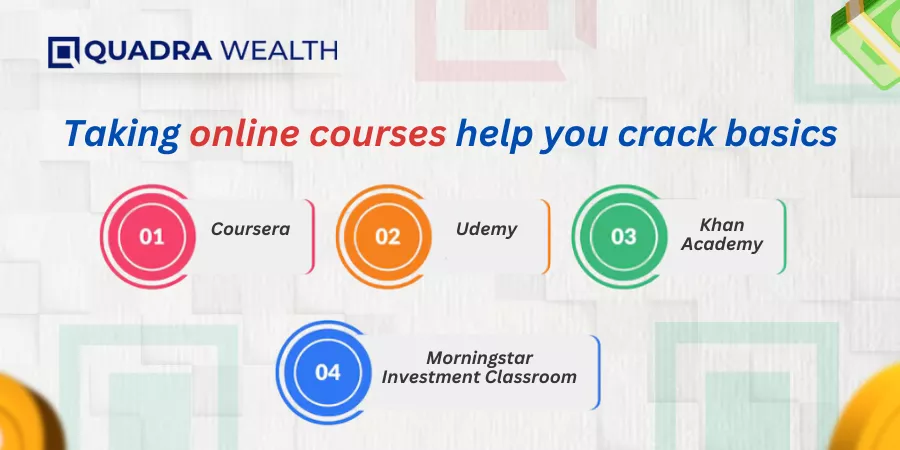Introduction
As a newbie investor, you may want to start afresh in the deep ocean of finance and investments. However, it is your hard-earned money that you are dabbling with. Therefore, you do not want slip-falls en route your journey with investing.
Here is where you educate yourself on what investing is all about. You must learn about different types of investment schemes vis-à-vis the financial instruments that go into the making. You must learn the pros and cons of financial instruments or trading derivatives to customize your investments.
On this parlance, let us unveil the 7 Best Ways To Learn About Investing. Helping you get started here:
What is your understanding of Investments?
Investments refer to dealing with financial derivatives or trading instruments in a neat and concise manner. Here, you must approach an investment firm or a banking corporation and speak to an investment advisor at length.
He would run you through different investment schemes and ask you what kind of assets you may want to invest with respect to choosing your personalized or customized investment baskets. Here, you choose bonds, equity assets, stocks, derivatives, or currencies to make your portfolios diversified. The loss of one financial instrument offsets the gain from others, and this way, your portfolios do not suffer unprecedented losses.
This is because new investors are exposed to the volatility of rising or falling markets, while they also carry the responsibility of taking care of their portfolios from any kind of capital degradation. Therefore, approaching a veteran with investments is the right way to put your best foot forward, as you do not want to lose your hard-earned funds.
What are the Best Ways To Learn About Investing?

First things first……
While you may want to start off on a positive note, you must research a few items on your ‘Investment Related Check Lists’
- What is your initial deposit going to be?
- What are the financial assets you are going to invest in trading portfolios?
- What is the capacity for handling market-related risks? In other words, what is your risk tolerance ratio?
- Would you want to actively trade, or want a more passive approach to trading, or watch your investments grow?
- Finally, do you have immediate, medium-term, or long-term financial objectives that need to be taken care of?
On this note, let us unveil the 7 Best Ways To Learn About Investing. Helping you get started here:
Reading Investment Books
You can read good books that are written by Financial Authors or by Investment professionals who have converted their years of experience into well-curated books. This is the best way for you to familiarize yourself with how investments work and how you can use financial or trading instruments to the best of your advantage. Here are a few books that are best-selling authors worldwide, and you could get yourself copies of these:
- “The Intelligent Advisor” by Benjamin Graham
- “A Random Walk Down Wall Street” by Burton Malkiel
- “Common stocks and Uncommon Profits” by Philip Fisher
- “The Little Book of Common Sense Investing” by John C Bogle
By reading these books, you can build your familiarity around finances and investments, and therefore you can make well-informed investment decisions for you and for your family members.
Listen to Investment Podcasts
As a newbie investor, you may not be quite well-versed with the pros and cons of every financial platform vis-à-vis the investment benefits you get under each financial domain. It can be an overwhelming task to steer yourself of complications and come to well-informed investment decisions.
Therefore, you can put yourself in a better frame of mind when you listen to financial podcasts wherein you have experts teaching you the tricks of the trade, and you get insider trading secrets from the horse’s mouth. You can take notes while you listen to financial podcasts. And, make sure you listen to these podcasts early in the morning when your mind is fresh and ready to bask in with new ideas or methodologies. Later that evening, you can create Excel sheets of your learnings so that you do not miss out on each one of these podcasts.
You can also listen to these financial podcasts while you are commuting to the office or while you work out at your gym. Are you wondering what are these podcasts you can choose from in the first place? Well, we have got you covered with our coveted checklists here:
- BiggerPockets Money
- The Investor’s Podcast
- Animal Spirits and
- We study billionaires
Watch YouTube Channels
There are a couple of YouTube Videos that break complex concepts into easy to understand videos. You can download a few of these videos on your pen drives so that you can revisit these videos later down the line.
Here are a couple of YouTube Channels of an investment stature. The List Includes:
- Andrei Jikh
- Graham Stephan
- The Plain Bagel and
- The Whiteboard Finance
Taking online courses help you crack basics

When you take up online courses, you can choose those type of courses that are free of charge while few edu tech companies charge you with affordable fees to help you deep dive into investment or financial topics.
Here are online programs that you can have hands-on with:
A- Coursera
This is a unique program that collaborates with the University of Illinois, USA. The concepts are taught to you right from the basics, and when you opt for the program, you can get certified at the end of it.
B- Udemy
Udemy offers short-term training programs for just about anything under the sun. You can choose topics like 1. Trading basics 2. Bonds/ investments or use other long-tail keywords to have access to a few of these lucrative topics that could match your area of interest here. The courses are less than $10 in most cases, and you can have a program certified at the cost of getting yourself a cappuccino from Starbucks.
C- Khan Academy
You can access Khan Academy, which offers you training programs free of cost, if it’s just gotta do with learning your basics correct. You can then sign up for paid courses if you want to learn investment related jargons on a more comprehensive note.
D- Morningstar Investment Classroom
This brand particularly focuses on individuals who have a flair for knowing more about long-term investment options like say 1. Estate Planning 2. Retirement planning or 3. Tax Planning. You can choose this program to learn about the pros and cons of every investment plan that focuses on long-term investing.
Practice with simulators
Once you have learnt the basics of investing, you must practice your moves on simulator boards. These simulators help you perfect your nuances on trading or help you get your moves correct while you may want to buy or sell shares in the equity markets. You must practice with simulators and get well-prepared before you make your first deposit with an investment firm.
Here are the labels of simulator boards that you can typically get hands-on with:
- Investopedia Simulator
- MarketWatch Virtual Stock Exchange
- Thinkorswim (Paper trading brought to you by Ameritrade)
Knowing the latest trends inside financial markets
In order to learn the latest trends into financial trades or into the investment domain, you must follow your markets diligently. Here are news channels that help you get the latest updates into the financial markets:
- CNBC, Bloomberg, and Yahoo Finance
- Use apps like Robinhood, Fidelity or Webull to follow stocks
Joining Communities helps you stay connected
You can sign up with financial communities so that you do not feel intimidated by intense competition from the world of finance or investments. There is no one size that fits all hat you could possibly think of.
You are not alone in this journey, and these are communities where you can meet people in real time and get your queries or grievances answered. Here are social media communities you can get hands-on to:
- Reddit- For Personal Finance or For Personal Investing
- Bogleheads.org (which is focused on index-based investing
- Discord groups and
- Facebook Investment Communities
The Bottom Line
We have seen 7 different platforms that could help you break the ice between wanting to start afresh and between learning the basics on the nuances of trading and investing. You can follow one of these mediums to help you learn investments better. What are your thoughts on this? Do mention it in the comments below!
Frequently Asked Questions or FAQs

As a beginner, can you start investing inside the stock market?
Answer: Yes, you can practice market moves on simulator boards or read books to help you understand the nuances of trading before you indulge buying or selling of individual stocks or shares using your real time money.
Explain return on investment
Answer: Return on investments refer to the income you earn and it is abbreviated as the ROI. The RoI factor allows you to invest with a passive income attribute attached to the investment portfolio. ETFS or Mutual funds guarantee lucrative ROIs on their investing portfolios.
How do you arrange for your minimum investment or also known as the initial deposit, for an investment platform?
Answer: You can build an emergency fund by putting your disposable part of your income. You can choose low-cost investing initiatives. This type of investing involves lesser expenses or brokerage fees you may have to shell out from your end, and this way, you can maintain a favorable debt equity ratio in the years to come.






